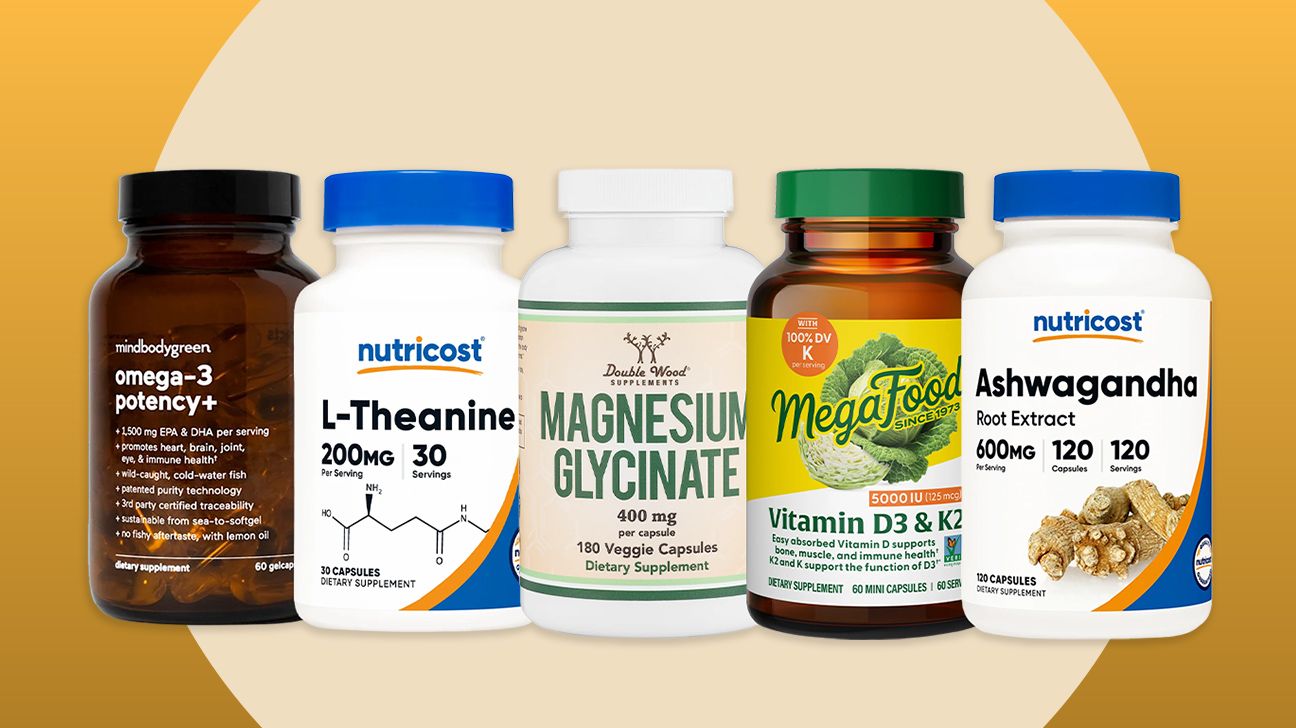Key takeaways
- Emerging research suggests that certain vitamins and supplements, such as magnesium, vitamin D, and omega-3, may help reduce anxiety.
- While not a cure, they may support standard anxiety treatments such as psychological therapies or medication.
- Our top rated magnesium supplement for anxiety is Double Wood Magnesium Glycinate.

Anxiety is a common mental health condition. In fact,
Anxiety disorders include generalized anxiety disorder (GAD), panic disorder with or without agoraphobia, social anxiety disorder (SAD), and specific phobias.
Treatment
However, research suggests that dietary changes, including taking certain vitamins, minerals, and other supplements, may also be helpful for people with anxiety disorders.
Discover our pick of the top rated supplements for anxiety below.
A note on price
Generally, prices for anxiety supplements range from $0.06 to $2.50 per count, or $13 to $74.99 per container, though this may vary depending on where you shop.
Note that the dosage recommendations vary between 1 to 3 capsules or tablets, 1 to 5 times daily.
Pricing guide:
- $ = under $0.25 per serving
- $$ = $0.25–$0.75 per serving
- $$$ = over $0.75 per serving
A note on supplements
Before trying any new supplements for anxiety, it’s important to ask your healthcare professional about potential medication interactions or safety concerns.
While supplements may be used to help manage anxiety, they do not provide a cure. Therefore, when selecting supplements, be wary of products that claim to treat or cure anxiety disorders.
Here’s a quick look at how our picks compare:
Many products are on the market, which may leave you wondering which ones are best. The supplements for anxiety selected above were chosen based on the following criteria:
- Efficacy. The primary ingredients are supported by current research to be safe and effective.
- Brand reputation. The supplements are produced by reputable brands that use third-party testing.
- Quality. The supplements prioritize high quality ingredients.
- Vetting: Supplements that we’ve vetted to ensure that they align with Healthline’s brand integrity standards and approach to well-being; read more about our vetting process.
If you’re interested in taking supplements to manage anxiety, it’s important to speak with your healthcare professional first.
Not all supplements are safe or appropriate for people with anxiety, especially if you’re taking one or more medications.
Also, be aware of supplement blends that are marketed to treat or cure anxiety.
Although some supplements have been shown to help reduce anxiety symptoms, other interventions, such as therapy, diet, and lifestyle modification, and medication, may be more effective.
When shopping for supplements, always purchase products from reputable manufacturers.
Look for supplements that are certified by third-party organizations like NSF International and USP. These organizations test supplements for potency, contaminants, and more to ensure consumers are receiving a safe and quality product.
Research suggests that certain dietary supplements and natural remedies may help reduce anxiety, including:
- magnesium
- vitamin D
- l-theanine
- ashwagandha
- omega-3
- vitamin C
When comparing ashwagandha and magnesium for anxiety, both have shown potential benefits but appear to work differently.
Ashwagandha may help reduce anxiety by lowering cortisol and increasing serotonin.
Meanwhile, magnesium is a vital mineral involved in many bodily function. Deficiencies have been linked to increased anxiety, and supplementation may help reduce symptoms by supporting brain function and calming the nervous system.
The 333 rule is a common and informal technique for coping with anxiety.
It involves identifying three objects and three sounds, then moving three body parts.
In doing so, you may help ground yourself and calm yourself down when you are feeling particularly anxious.
Anxiety is a common mental health condition. For some people, it can interfere with their daily activities.
Fortunately, anxiety disorders can be managed with therapy, medication, and dietary changes, including supplementation.
Research suggests that certain dietary supplements may help reduce anxiety symptoms, including magnesium, vitamin D, L-theanine, ashwagandha, omega-3s, and vitamin C.
If you’re interested in trying any of the supplements listed above, it’s best to first consult with your healthcare professional to ensure that the supplement is safe and appropriate for your specific needs.






